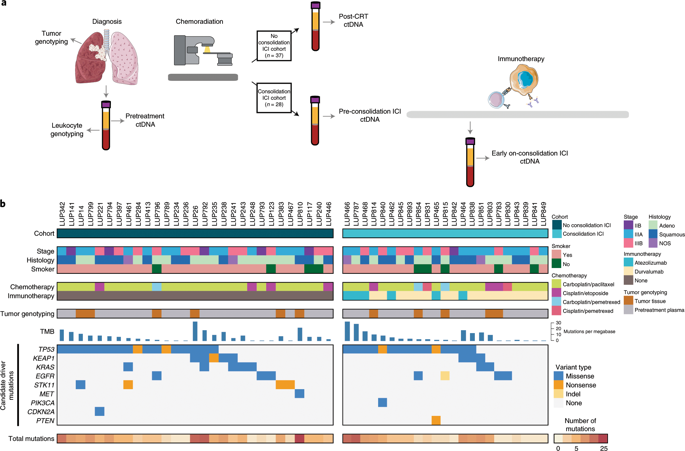Nature Cancer ( IF 23.5 ) Pub Date : 2020-01-20 , DOI: 10.1038/s43018-019-0011-0 Everett J Moding 1, 2 , Yufei Liu 3 , Barzin Y Nabet 2 , Jacob J Chabon 2 , Aadel A Chaudhuri 4 , Angela B Hui 2 , Rene F Bonilla 1 , Ryan B Ko 1 , Christopher H Yoo 1 , Linda Gojenola 5 , Carol D Jones 5 , Jianzhong He 3 , Yawei Qiao 3 , Ting Xu 3 , John V Heymach 6 , Anne Tsao 6 , Zhongxing Liao 3 , Daniel R Gomez 3, 7 , Millie Das 8, 9 , Sukhmani K Padda 8 , Kavitha J Ramchandran 8 , Joel W Neal 8 , Heather A Wakelee 8 , Billy W Loo 1 , Steven H Lin 3 , Ash A Alizadeh 2, 8, 10 , Maximilian Diehn 1, 2, 10

|
Circulating tumor DNA (ctDNA) molecular residual disease (MRD) following curative-intent treatment strongly predicts recurrence in multiple tumor types, but whether further treatment can improve outcomes in patients with MRD is unclear. We applied cancer personalized profiling by deep sequencing (CAPP-Seq) ctDNA analysis to 218 samples from 65 patients receiving chemoradiation therapy for locally advanced non-small-cell lung cancer, including 28 patients receiving consolidation immune checkpoint inhibition (ICI). Patients with undetectable ctDNA after chemoradiation therapy had excellent outcomes whether or not they received consolidation ICI. Among such patients, one died from consolidation ICI-related pneumonitis, highlighting the potential utility of only treating patients with MRD. In contrast, patients with MRD after chemoradiation therapy who received consolidation ICI had significantly better outcomes than patients who did not receive consolidation ICI. Furthermore, the ctDNA response pattern early during consolidation ICI identified patients responding to consolidation therapy. Our results suggest that consolidation ICI improves outcomes for non-small-cell lung cancer patients with MRD and that ctDNA analysis may facilitate personalization of consolidation therapy.
中文翻译:

循环肿瘤 DNA 动力学预测局部晚期非小细胞肺癌巩固免疫治疗的益处
根治性治疗后的循环肿瘤 DNA (ctDNA) 分子残留病 (MRD) 强烈预测多种肿瘤类型的复发,但进一步治疗是否可以改善 MRD 患者的预后尚不清楚。我们通过深度测序 (CAPP-Seq) ctDNA 分析对 65 名接受放化疗局部晚期非小细胞肺癌患者的 218 个样本进行了癌症个性化分析,其中包括 28 名接受巩固免疫检查点抑制 (ICI) 的患者。放化疗后 ctDNA 检测不到的患者,无论是否接受巩固 ICI,均具有良好的预后。在这些患者中,一名患者死于合并 ICI 相关肺炎,这凸显了仅治疗 MRD 患者的潜在效用。相比之下,放化疗后出现 MRD 且接受巩固 ICI 的患者的预后明显好于未接受巩固 ICI 的患者。此外,巩固 ICI 期间早期的 ctDNA 反应模式识别出对巩固治疗有反应的患者。我们的结果表明,巩固 ICI 可以改善患有 MRD 的非小细胞肺癌患者的预后,并且 ctDNA 分析可能有助于巩固治疗的个性化。











































 京公网安备 11010802027423号
京公网安备 11010802027423号